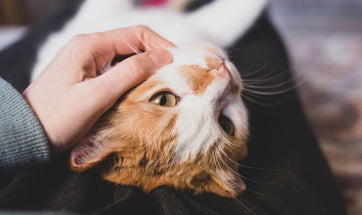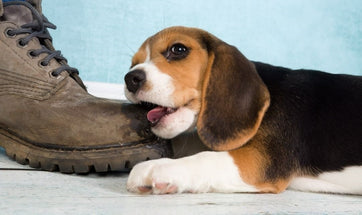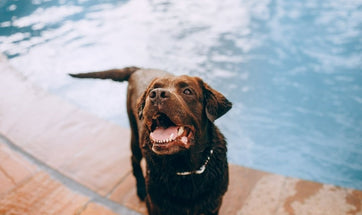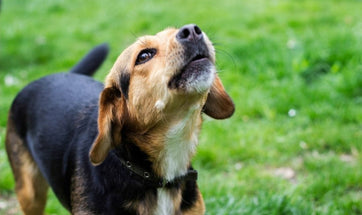How To Introduce Your Dog To A New Born Baby?
A Lot of New Human Parents Worry How Their Dog Will React To Their New Born.
This is a natural concern. And an Important one too! But don't worry, all dogs love their humans and with the right steps, dogs will love their little humans too.
Welcome to our guide on how to introduce your dog to your new born baby. When you bring home a new baby, what’s exciting for you and your spouse can be confusing and even frightening for your dog. Think about it: That little baby seems like a human, but it smells, sounds, and moves like nothing your pet has ever seen before. And suddenly this strange, loud creature is taking up all of his owners’ time and attention. Dogs can be eager learners, but they can also exhibit jealousy because they are no longer the center of attention. Just like a normal human child.
Once they know that their humans really care for both them and the new strange crying, smelly thing :) they will be just fine!
Important Discussion Points In This Guide
- Steps to Take Before the Baby comes home
- Steps to Take While Introducing the Baby to the Dog
- The First Few Weeks After The Baby Comes Home
- What to keep in mind as the baby grows
Steps to Take Before the Baby Comes Home
A little preparation goes a long way in setting up your dog and your baby for success. Just like you would pick out the baby room color, baby cribs, clothes, rocker, stroller etc, spend a few minutes each day before the baby arrives in getting your original four legged baby ( your dog ) ready for the child.
Gradual Changes to the Dog's Routine a Couple of Months Prior to Delivery
Make gradual changes to your dog’s routines—such as a change in where the dog sleeps or when he gets walked —before the baby comes home, so that the dog will not associate the changes with the baby. Go through the baby’s routine before the baby arrives, including changing, feeding, rocking and walking with an empty stroller.
Control Playtime
Lessen the amount of play and attention you give your dog two to three weeks before the baby comes home. You do not want to “last minute” lavish your dog with affection, only to have it stop when the baby comes home.
Get the Dog Ready for Baby Sounds and Smells
Play a tape recording of various baby sounds in your house for increasing lengths of time so your dog can adjust to the new sounds before you bring the baby home.
Acclimate your dog to baby smell, including lotion, powder, etc. Once the baby is born, bring an article of the baby’s clothing or a baby blanket home so the dog can get used to the infant’s scent.
Honestly we think this is a great exercise for everyone in the house! If you have grandparents or other kids in the house, they can get used to the sounds too!
Setting Up A Comfort Spot
Before the baby arrives, teach your dog to identify a comfortable place to resort to when he doesnt get your attention that he was so used to. Use the command “Go to BED.” You can use any mat, bed, or defined area to teach this behavior. Stand beside the bed or area you want your dog to go. Point to the area, praise as soon as your dog is on his place, and reward with treats. Use a release command like "Come" and toss a treat to encourage your dog to come off the mat. When your dog learns where his place is, add a sit or down. Gradually increase the length of time the dog stays on the bed and give your dog something rewarding on his place, like a plush or a chew toy.
Shop for comfortable Poochles plush or chew toys here.
"Getting your Dog Ready For Your baby 2-3 months before the baby can go a long way in a happy household."
Claim Your Baby’s Scent
Bring an item that contains your baby’s scent, such as a burp cloth, from the hospital before bringing home the baby. During this exercise, it is crucial that you set clear boundaries. Challenge the dog to sniff from a distance, while you are holding the item. By doing so, you are communicating to your dog that the item is yours and then giving permission for the dog to sniff. “This new item belongs to me, and you will need to follow my rules when around it.” This helps start the process of creating respect for the baby.
Our dogs are very in tune with us, so with an event as monumental as a pregnancy, your dog has already sensed that something is up. But just because she has picked up on the new feelings hanging in the air, doesn’t mean that she understands what they mean.
Steps to Take While Introducing the Baby to the Dog
Start by taking your dog on a long walk. Be sure to drain all of your dog’s energy. Before returning, wait at the door step; make sure your dog is in a calm-submissive state before inviting her in. Upon entering, your dog will instantly know there is a new scent in the house. If you have already introduced the scent, it will be somewhat familiar. The mother or father holding the baby must be in a completely calm state.
Allow your dog to adjust to the smell, sight and sound of the baby for a few days before introducing them in closer proximity.
After a few days, allow the dog to sniff the baby while controlled on a leash. Pet him and give him praise while he sniffs. Most dogs adapt easily, but always take precautions. Always allow the dog to approach you and the baby. Allow the dog to choose to interact with the baby.
Once your dog is used to the baby’s smell, allow the dog to sniff the baby off leash. Your dog may react differently if the baby suddenly screams, cries or kicks and interpret these signs as an invitation to play or as a warning. When interacting with the dog and baby, keep the baby elevated and make sure an adult is between them at all times. Dog-adult-baby seating order.
Give your dog plenty of attention when the baby is around. You don’t want him to decide good things only happen when the baby isn’t around.
Don’t scold the dog for picking up the baby’s toys. You don’t want the smell of the baby being associated with anything negative. Simply replace the child’s toy with the dog’s toy.
Dogs Love Children and Play Time. Getting them set up first, is very important.
The First Few Weeks After the Baby Comes Home

Never leave even the most trusted dog alone with a baby or small child!
Have the dog resort to the "comfort zone" where he or she can get away when the activity is too much for him or her.
Dont forget to give attention to the dog. In the mayhem of having a child at home, one can easily forget the dog. Please dont do that!
It is OK to keep the dog out of the baby’s room with a gate, etc., especially if he is curious and attempts to jump on the crib or changing table.
What to Keep in Mind as the Baby Grows
Babies change quickly, and it can be difficult for the dog to adapt as quickly.
Once your baby begins to crawl, make sure that he/she doesn’t pull on the dog’s tail or ears. Snapping and growling are natural canine behaviors when they are trying to communicate a warning. Even the most tolerant dog has its limits!
Continue to give your dog plenty of attention when the baby is around. You don’t want him to decide good things only happen when the baby isn’t around.
Another important thing to keep in mind is as your child grows and starts to gently walk around ( 12 months - 2 years ), dogs can sometimes knock babies down. Especially the bigger dogs. They wouldnt do this on purpose, but it is just inevitable. Kids will definitely not get hurt, but they will cry when they fall. It is advised to have a watchful eye over your kid and the dogs during this critical phase when the child learns to walk.
Over time, your dog will learn to respect and love your child just as you do. Then they will become inseparable! Our CEO's son Ronith, considers their dog Mylo as his brother! They are one soul in two different body types and go around everywhere together in the house. It is a joy to watch.
related posts
How To Bond With Your Cat - Do's & Don'ts Of Interacting With Cats
Spending time and bonding with your cat is one of the most heart-warming parts of being a cat parent. And no matter if you have brought a new kitty home...
Destructive Dog Chewing - Causes & Solution To Excessive Chewing In Dogs
Dogs chewing is completely normal until it gets out of hand. Parenting a dog who has a destructive chewing habit can be a handful but you need to understand that...
Vet Answered Dog Summer Care Tips - How To Care For Your Dog In Summer
As the seasons come and go, there’s one question that all pet parents have when the temperature rises - “How Do I Take Care Of My Dog In Summer?”. So, we...
Why Do Dogs Howl - 5 Reasons Behind A Dog's Howl
From "your dog has seen a ghost" to "your puppy is in pain", we have heard many reasons why dogs howl. But have you ever wondered what the real reason behind...
OUR NEWSLETTER
Get the latest news you need, straight to your inbox.




